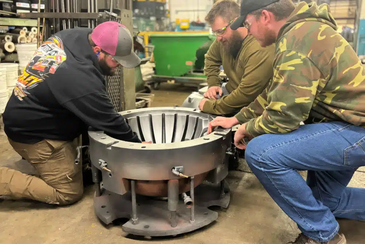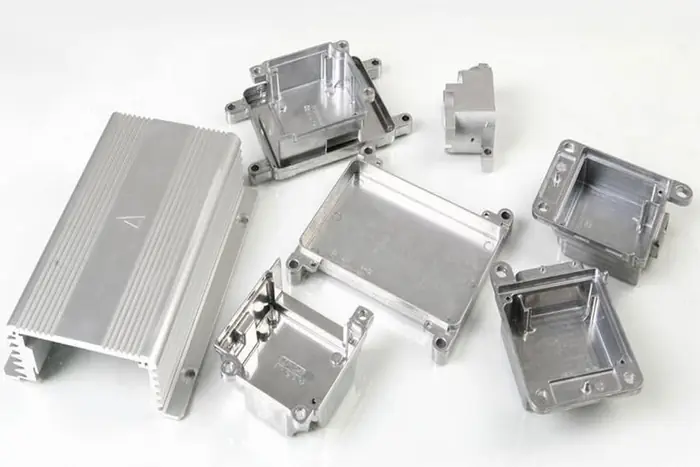How an Aluminum Casting Company supports efficiency in production
Wiki Article
The Role of Aluminum Foundries in Advancing Lightweight Production Solutions
Aluminum factories considerably contribute to the advancement of lightweight manufacturing options. Their innovative casting technologies generate high-strength, light-weight components vital for sectors such as automotive and aerospace. This improvement not just enhances item efficiency yet also promotes sustainability through making use of recycled materials. As these foundries adjust to arising methods and innovations, they lead the way for future developments in manufacturing effectiveness and environmental responsibility. What lies ahead in this transformative journey?The Benefits of Lightweight Products in Production
As markets increasingly seek effectiveness and sustainability, the adoption of lightweight materials in manufacturing has arised as a crucial strategy - aluminum casting. These products, especially light weight aluminum and composites, provide many advantages that boost production processes and product efficiency. Primarily, their decreased weight adds to reduce energy intake throughout transport and procedure, leading to substantial expense financial savingsIn addition, light-weight products assist in the design of more complex geometries, enabling better development in product advancement. This flexibility typically leads to improved functionality and performance, satisfying the advancing needs of modern-day consumers.
Additionally, the usage of light-weight materials can enhance the durability of items because of their resistance to corrosion and exhaustion. This sturdiness not only minimizes maintenance prices but likewise supports sustainability initiatives, as longer-lasting products add to much less waste. To summarize, the advantages of lightweight products are critical in driving efficiency, advancement, and ecological duty in manufacturing.
Advancements in Aluminum Spreading Technologies
Current advancements in aluminum spreading innovations are revolutionizing the manufacturing landscape, especially in the production of lightweight elements. Technologies such as high-pressure die casting and vacuum pass away casting have substantially improved the accuracy and surface coating of aluminum components - Precision aluminum casting. These approaches permit the development of complex geometries while decreasing product waste and enhancing mechanical homes
Furthermore, the application of real-time monitoring systems ensures quality assurance throughout the spreading process, resulting in even more consistent item results. Collectively, these advancements not just boost the efficiency of light weight aluminum components but likewise sustain the market's change in the direction of even more sustainable production techniques.
Applications of Light Weight Aluminum Elements in Numerous Industries
While light weight aluminum elements have long been utilized in numerous sectors, their convenience and light-weight residential or commercial properties continue to drive innovative applications across industries such as automobile, aerospace, and construction. In the automobile market, aluminum is increasingly made use of for engine blocks, wheels, and body panels, improving fuel performance and performance. Aerospace suppliers take advantage of aluminum for airplane frameworks and elements, utilizing on its strength-to-weight ratio to boost fuel economic situation and payload ability.In the building and construction industry, aluminum is favored for home window frameworks, roof covering, and architectural elements, offering longevity and resistance to rust while decreasing total structure weight. In addition, the electric and electronic devices markets take advantage of aluminum's conductivity and light-weight nature, using it in wiring, rooms, and heat sinks. These varied applications highlight the essential duty of aluminum elements, which not just satisfy market needs however likewise contribute to developments in item layout and capability throughout multiple areas.
Sustainability and Power Efficiency in Aluminum Foundries
The aluminum click for info shop industry plays an important duty in promoting sustainability and power effectiveness, particularly as demand for light-weight components proceeds to expand across various industries. Shops are increasingly embracing eco-friendly practices, such as making use of recycled aluminum, which substantially reduces energy usage and greenhouse gas emissions contrasted to main aluminum production.Furthermore, innovations in casting modern technologies improve power have a peek at this website efficiency by optimizing the melting procedures and lowering waste. Techniques like die casting and investment spreading enable precise material usage, decreasing excess and scrap.
Furthermore, many shops are buying renewable resource sources to power operations, further reducing their carbon footprint. Executing power management systems allows factories to keep an eye on and improve energy use, guaranteeing they run at peak effectiveness.

Future Fads in Lightweight Production Solutions
Exactly how will arising modern technologies shape the future of lightweight manufacturing remedies? Advancements such as innovative products, automation, and additive manufacturing are readied to redefine manufacturing processes. The assimilation of wise production technologies, including the Web of Points (IoT) and artificial intelligence (AI), will make it possible for real-time monitoring and optimization, improving effectiveness and minimizing waste.
As sustainability remains to be a vital problem, light-weight options will significantly concentrate on reusing and recycling materials, lining up with from this source round economy concepts. This advancement in lightweight manufacturing will certainly not only enhance item performance but likewise contribute to ecological goals, making sure that the sector remains affordable in a rapidly transforming market landscape.
Frequently Asked Concerns
Exactly How Do Light Weight Aluminum Foundries Make Sure Quality Assurance in Production?
Light weight aluminum shops guarantee quality assurance in manufacturing through extensive testing, standardized treatments, and continual tracking - Aluminum Foundry. They apply innovative innovations and experienced workers to keep consistency, reduce flaws, and satisfy sector standards throughout the production procedureWhat Are the Main Tests Dealt With by Light Weight Aluminum Foundries?
Light weight aluminum foundries face challenges such as changing basic material prices, preserving production performance, making sure regular quality, adjusting to technical developments, and conference ecological policies, all of which influence their overall functional effectiveness and competitiveness on the market.How Does Light Weight Aluminum Recycling Impact Factory Procedures?
Aluminum recycling significantly enhances factory operations by decreasing raw material expenses, decreasing power intake, and decreasing ecological influence. This sustainable method allows factories to enhance effectiveness while satisfying increasing demand for light-weight, high-performance aluminum items.What Abilities Are Needed for Workers in Aluminum Foundries?
Employees in light weight aluminum foundries need skills in metallurgy, machining, quality assurance, and safety and security practices. Proficiency in running equipment, comprehending alloy residential or commercial properties, and analytic are additionally important for reliable manufacturing and preserving high safety standards.Exactly How Do Light Weight Aluminum Foundries Deal With Waste Monitoring?
Aluminum shops take care of waste through recycling scrap metal, using reliable waste segregation methods, and adhering to environmental policies. They implement lasting practices to minimize landfill payments, making certain that harmful materials are dealt with responsibly.Light weight aluminum shops considerably add to the evolution of light-weight manufacturing options. Recent developments in light weight aluminum spreading technologies are transforming the manufacturing landscape, specifically in the production of light-weight components. While light weight aluminum parts have long been made use of in different sectors, their flexibility and light-weight buildings continue to drive innovative applications across markets such as vehicle, aerospace, and building and construction. Additionally, the electric and electronics markets benefit from aluminum's conductivity and light-weight nature, using it in wiring, enclosures, and warmth sinks. The light weight aluminum foundry sector plays an important role in promoting sustainability and power efficiency, especially as need for lightweight elements proceeds to expand throughout different markets.
Report this wiki page